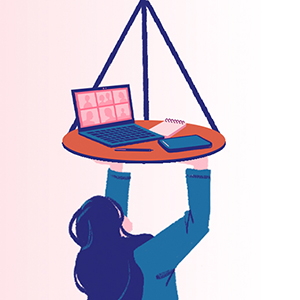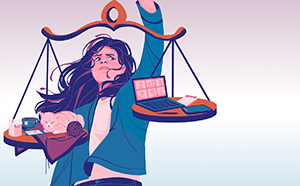Self-care is an often-discussed topic among social workers, the organizations that employ them, and the profession as a whole—and for good reason. Social work is a challenging career choice in myriad ways. From the client-based schedules that often extend into the evenings, to the lack of resources available for organizations and individuals, to the emotional toll service work can take on a professional, social workers are likely to feel overwhelmed and stressed—at the very least—at multiple points in their career.
Evidence of this exists in the rates of both turnover and burnout throughout social work. It is estimated, for example, that turnover rates for caseworkers in child welfare averaged 30% nationally before the COVID-19 pandemic. (Casey Family Programs.) Similarly, researchers in 2005 estimated the rate of burnout among social workers to be nearly 40% with a lifetime rate of 75%. (Journal of Social Service Research.)

While self-care will not eliminate all of the factors leading to high turnover and burnout rates, it is one of the pieces most needed to help social workers. However, even though the importance of self-care is highlighted in trainings, webinars, podcasts, and, yes, articles, the application of self-care tends to fall short. Social workers as individuals and as a profession are not good at practicing self-care.
“Just like firefighters will run into a burning building, we ourselves are on the front line,” says Kristen Lee, Ed.D, LICSW, Behavioral Science faculty at Northeastern University, author, and speaker. “Thus by the very nature [of social work], it allows people practicing social work limited time in which to tend to their own needs.
“Secondly,” she adds, “I think we can suffer from the curse of knowledge. Because we are very versed in self-care strategies, we know what we’re supposed to do and then there can be this bias in our mind that it somehow gives us immunity or protection.”
For social workers to move from discussion to application, they must think differently and more deeply about self-care and the factors preventing them from implementing it in their own lives.
Benefits of Self-Care
One of the reasons social workers struggle with self-care may be their understanding of it as a practice. Many view self-care as preventive—a tool to be used in preparation for times of crisis. Lisa Butler, PhD, associate professor and co-director of Joining Forces-UB at the University of Buffalo School of Social Work, says while self-care can be preventive it is also a practice of maintenance.
“I think, and this is my point of view,” she says, “that self-care has two aims. One is protective—trying to protect health care workers from stress and burnout, and two is enhancement of well-being.”
Self-care when done with intention and ongoing not only helps social workers through particularly stressful moments in their career but also adds to their wellness overall—in times of low and high stress. Professionals who practice self-care have been found to have increased energy and a lower risk of illness, for example. Studies have even found that it could improve cognitive functioning. According to Florida State University College of Social Work, “Practicing common self-care habits is linked to improved cognitive function, so you’re better equipped to do your work. A recent Harvard Health report describes such routines as key for optimal brain health and fitness."
Further, a study completed by Butler and colleagues in 2016 found that when the clinicians-in-training who participated in the study had a high rate of self-care efforts, they experienced higher rates of compassion satisfaction. Conversely, the individuals in the study with lower self-care efforts reported greater levels of stress as well as burnout.
Of course, the opposite is true as well. Practicing self-care can provide long- and short-term benefits. Not doing so can be detrimental. Social workers who do not practice self-care may see longer term impacts on their overall well-being in addition to burnout and stress. “On the individual level in terms of toll,” says Lee, “it can have catastrophic impact on one’s health.” She adds that it can lead to social workers becoming cynical or jaded, impact their personal and professional relationships, and diminish the efficacy of their work.
Beyond the Gimmick
Understanding the benefits of self-care both in moments of crisis and long-term, however, is just one hurdle social workers need to overcome to better apply the tenets of self-care. Social workers also have to shift their view of what self-care means.

“I think in our culture, not just social work, that self-care has become very gimmicky, and that’s incredibly unfortunate,” says Butler, adding that when many talk about self-care they reduce it to cliché suggestions like having a bubble bath. That is both over-simplifying and over-generalizing self-care. “It needs to be a practice. It really has to be a part of your life. It’s a very individual commitment,” she says.
Gina Rosich, PhD, MSW, assistant professor of social work in the Department of Social Work and Equitable Community Practice at the University of St. Joseph, notes that once social workers and social work students start looking at self-care more individually, they begin to recognize some of the practices already incorporated into their lives. “There are things that they do that they don’t think of as self-care: having a night out with friends, exercising, watching a guilty pleasure TV show,” she describes. “I do try to get them away from doom-scrolling on their phone."
Lee adds that social workers must also develop self-care routines that go beyond the surface, finding “deeper aspects of self-care that are much more substantive. We need to think more strategically of substantive self-care and how that collides with the [fact] that time is thin. We have to look to leverage the protective factors that we have.”
Systemic Challenges
But, says Rosich, it’s not just about identifying a meaningful and sustainable self-care practice that works for the individual. It’s also about feeling able and wanting to prioritize that practice. To a degree, it is the individual who has to push self-care to the forefront, and it is often the individual who allows it to fade to the back.
“Young social workers, like any young professionals, are going to feel like they have something to prove —unless you have supervisors who are really watching out for you. When you are further advanced in your career, there’s a pressure to model always being available,” Rosich says.
“At the end of the day,” she continues, “there’s only so much that you can do. Your productivity and what you can give back to your clients, your co-workers, your profession is diminished when you are drinking from an empty cup. I wish I had known that it was OK to say ‘I’ve reached my limit’ and not feel pressure that is unreasonable.”
Outside of the stage of one’s career, professionals who don’t feel secure in their position or who are concerned about advancing may not feel they can risk setting the boundaries at and around work needed for ongoing self-care. One must feel that they have the support of their employer to be comfortable. Supervisors, as Rosich noted, can have a huge impact when they both model and encourage healthy self-care practices.

However, the responsibility of self-care does not all fall on the individual social worker’s shoulders. The opportunity to take action has to exist as well. That responsibility falls to the organizations that employ social workers, leaders within the profession and the profession as a whole.
“Social workers and social work students seem to overwhelmingly agree that self-care is important and beneficial,” says Allison Berkowitz, DSW, MSW, assistant professor of social work at the University of Northern Alabama. “It is my firm belief that most social workers and social work students know exactly what makes them feel healthy, happy and whole. And they would likely be capable of meeting most of their self-care needs, if only they had the resources allowing them to do so.”
Those resources may be flexibility at work, as well as a supportive and trauma-informed professional environment, but they also include time, money and energy.
“From what I’ve read in the academic literature, seen in research conducted myself, and heard in anecdotes from students and colleagues, the disparity between the discourse on self-care among leaders in the profession and the actual engagement in self-care by social workers and students can be primarily attributed to systemic issues,” Berkowitz says. She cites studies identifying low pay, student loan debt and other financial trends as one of the many challenges social workers face, for example.
“Sure, there is a degree of discipline and initiative needed to establish and sustain self-care practices, but the core issue appears to be the scarcity of essential resources like time and energy, along with an overwhelming burden of chronic stress,” she continues.
Paul O’Connell, a Philadelphia-area BSW-level social worker who recently chose to leave the profession rather than pursue his MSW, agrees. “Even if I didn’t have a super difficult day, I would come home drained. Then it’s hard to do anything other than make dinner, watch TV and go to bed.” While he says there are many reasons he is choosing to leave social work, a part of it was his ability or lack thereof to prioritize balance. “I wanted to start taking on a leadership role, so I took more onto my plate and ignored my creative or artistic pursuits.” O’Connell was at orientation for an MSW program when he realized he needed to step back, and while he believes he may one day return to or incorporate aspects of a helping profession into his career, he does not feel he will return to social work.
Changes Needed
For impactful change to occur around self-care, there needs to be a shift on all levels. For example, self-care needs to become a priority and a practice for social workers from the very start—enabling them to not only develop their own understanding of self-care early in their career, but also giving them the confidence to advocate moving forward. Some of that work is already being done.

Professors of social work recognize the importance of self-care and are working it into their curriculum. Butler, who created the Self-Care Starter Kit more than a decade ago as a complement to the school implementing a trauma-informed and human rights perspective, says she begins one of her courses with an entire class on self-care. The Self-Care Starter Kit is also available to students and any interested individuals, even if they are not connected to the University of Buffalo.
Rosich also emphasizes the need for self-care with her students, making sure to check in partway through the semester to discuss it and see how the students are faring with school, internships and additional obligations. She notes that she does see change starting.
“I think there may be a generational shift. I hate to generalize but I feel like work culture has started a general shift in this country, even outside of social work, where people are increasingly interested in having a work-life balance. That has become a part of the larger conversation,” Rosich says. “People are questioning some of these models of work and how we can make them better suited to our needs and the model of the profession.”
Lee also sees a greater willingness to discuss self-care and the issues surrounding it within her students. “I think that there’s definitely a much more refreshing level of candor and a deeper awareness around how vital it is,” she says. “I think students are more willing to talk about their own lived [experiences]. I think they’re very earnest for it, and they’re willing to do it.”
She adds that self-care “is embedded in all of the work that I do with students. It’s really the new imperative. Embed it in everything we do.”
Even with a more open and honest shift in how self-care is viewed and discussed, it will take time to implement change. “I believe a long and rough road lies ahead,” says Berkowitz. “It’s essential to remember that change won’t occur unless we actively pursue it. I believe that social workers, in whatever capacities we can, should become more organized and politically engaged.”
She encourages social workers who are interested and able to join their state NASW chapters and to speak with their co-workers about both stress and self-care.
“On a positive note,” she concludes, “I do believe a brighter tomorrow, where social workers and students get far more of their needs met, is possible—if we work for it.”
Sue Coyle, MSW, is a freelance writer and social worker in the Philadelphia suburbs.
Resources
NASW Self-Care Resource Page
Annie E. Casey Foundation stats
Journal of Social Service Research study
Kristen Lee